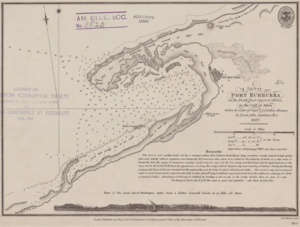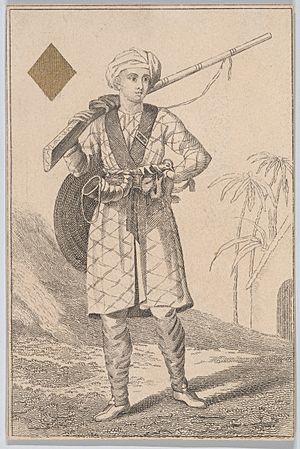British attack on Berbera (1827) facts for kids
Quick facts for kids Battle of Berbera |
|||||||
|---|---|---|---|---|---|---|---|
 An 1827 Admiralty Chart of Berbera |
|||||||
|
|||||||
| Belligerents | |||||||
|
|
|||||||
| Commanders and leaders | |||||||
|
|
|
||||||
| Units involved | |||||||
| Somali warriors | Royal Marines and Sepoys | ||||||
| Strength | |||||||
| 2,000-2,500 men and several buggalows | 250 men with 2 corvettes and 1 sloop | ||||||
| Casualties and losses | |||||||
| Several | Several including one Royal Marine killed | ||||||
The Battle of Berbera happened on January 10–11, 1827. It was a fight between the Royal Navy (Britain's navy) and the East India Company on one side, and the Habr Awal clan on the other. This battle was the result of earlier actions taken by the British against the Habr Awal.
Contents
Why the Battle Happened
In 1825, a British ship called the Mary Anne tried to dock at Berbera's port. However, it was attacked, and several crew members were killed by the Habr Awal clan. Because of this, the Royal Navy blocked the port of Berbera. Some stories say the city was even bombed right away.
Berbera was a very important port in the Gulf of Aden. It traded a lot with Harar further inland. Merchants from all over the western Indian Ocean came to trade there. The British blockade lasted until 1827. Then, a Royal Navy group led by Captain W.C Jervoise was sent to Berbera.
British Ships Arrive
The British group was made up of two corvettes and one sloop. These ships were the HMS Tamar, HMS Pandora, and HMS Amherst. HMS Tamar and HMS Pandora belonged to the Royal Navy. HMS Amherst was a ship of the East India Company.
The ships left Mocha, Yemen and met up. They arrived in Berbera on January 10. They immediately started firing at some Somali boats called buggalows in the harbor. Luckily, all the Somali boats escaped without harm.
After this first attack, Captain James Gordon Bremer sent a group ashore. This group was led by Lieutenant John Downey. He wanted to talk to the Sheikhs (leaders) of the Habr Awal about the 1825 attack on the Mary Anne. The Sheikhs agreed to meet the next morning.
The Battle Begins
On the night of January 10, Captain Bremer checked the harbor's depth. He found it was perfect for his ships. So, the next morning, the British ships moved into the bay of Berbera and dropped anchor.
As the British ships came closer, the Habr Awal set fire to their own city. They also started stealing goods from visiting Banyan merchants. These merchants were British subjects. In response, the British ships opened fire. They aimed above the crowds to scare them, not to kill them.
Captain Jervoise of HMS Pandora led a group of 250 Royal Marines and Sepoys ashore from HMS Amherst. They faced about 2,000 to 2,500 Somali fighters. The Somalis quickly scattered when they saw their well-armed opponents.
During the fighting, Captain Jervoise moved to take control of the center of Berbera. A smaller group led by Lieutenant Jeffrey Noble was attacked. One Royal Marine was killed, and several others were hurt. After Jervoise's group took control, the ships stopped firing. The fires in the city were slowly put out. The Somalis began to surrender in small groups, and talks started again.
What Happened After
After the battle, the Sheikhs of the Habr Awal asked for a few days. They needed time to gather other important leaders who were several days away from Berbera. The British first demanded 30,000 Spanish Dollars (a type of money). But the Sheikhs explained that the fires in Berbera had caused the Habr Awal a lot of damage. So, the British agreed to a payment of 15,000 dollars. This money would be paid over three years in smaller amounts.
The agreement settled the 1825 attack on the Mary Anne. It also allowed the British to trade safely in Berbera. All ships flying the Union Jack (the British flag) would have the same trading rights.
Letter to Saqr Al Qassimi
The Isaaq Sultan Farah Guled and Haji Ali wrote a letter to Sultan bin Saqr Al Qasimi of Ras Al Khaimah in the 1830s. They asked for military help and to join forces against the British. The Qasimi people were very active in the Gulf of Aden. They often attacked ships as far west as Mocha on the Red Sea. They had many trade connections with the Somalis. Ships from Ras Al Khaimah often visited trade fairs in the big ports of Berbera and Zeila. They knew the Isaaq people well. However, Sultan bin Saqr Al Qasimi did not send a reply.
See also
- Royal Navy
- Berbera
- Habr Awal
- Isaaq Sultanate
 | Jessica Watkins |
 | Robert Henry Lawrence Jr. |
 | Mae Jemison |
 | Sian Proctor |
 | Guion Bluford |


